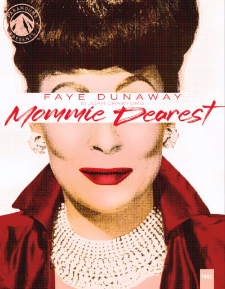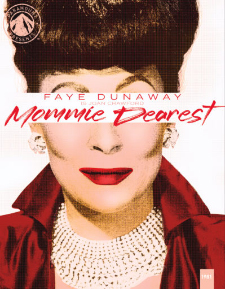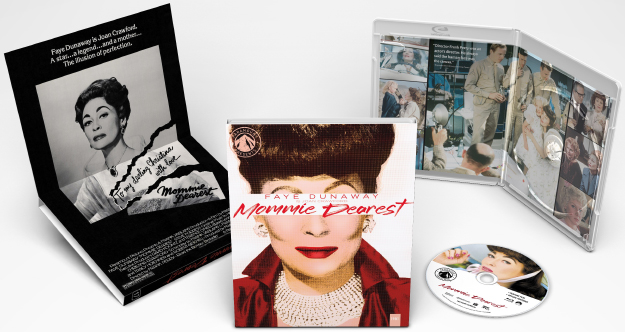Mommie Dearest: Paramount Presents (Blu-ray Review)

Director
Frank PerryRelease Date(s)
1981 (June 1, 2021)Studio(s)
Paramount Pictures (Paramount Presents #17)- Film/Program Grade: B
- Video Grade: A
- Audio Grade: B+
- Extras Grade: A
Review
Many people who see Mommie Dearest regard Joan Crawford not as one of Hollywood’s brightest stars of the 1930s and 1940s, but as a monstrously abusive, alcoholic mother. Based on the book by her adopted daughter, Christina, the film is an often harrowing look at a woman trying to juggle a career with mothering two adopted children (she would adopt Christopher a few years after Christina).
Mommie Dearest opens with Crawford’s morning ritual. Rising at 4 AM, she readies herself for a long work day at MGM. We don’t see her face until she’s in full make-up at the studio and an assistant director calls her to the set. This first revelation of Faye Dunaway is uncanny in her resemblance to Crawford, complete with heavy eyebrows and bright red lipstick. Dunaway has done her homework and captures the nuances of Crawford’s head movements, sidelong glances, grimaces, and only-for-the-camera publicity smiles.
Crawford uses her influence to maneuver the adoption agency into relaxing its standards and allowing her to adopt the infant she would name Christina. At first, a loving bond emerges between mother and daughter. But that changes when Christina, now about nine (played by Mara Hobel), learns the reality of being a child of a movie star. Whether posing for newspaper photos, joining Crawford for a Christmas radio broadcast, or helping to answer fan mail, she becomes more of a publicity asset than a little girl.
When she’s let go from her longtime home studio, she goes into an emotional tailspin and aims her frustrations and anger directly at Christina and Christopher. These outbursts involve chopping down rose bushes in the middle of the night and ordering the children routed out of bed to help, and beating Christina with the wire hanger she’s discovered in the little girl’s closet. These scenes, featuring a disheveled Dunaway braying her lines at peak volume, are the most memorable in the film and have earned it a reputation as a camp classic.
In every scene, whether violently furious or quietly seething, pasting on a PR smile or genuinely pleased, Dunaway captures the essence of Crawford from middle age onward. Her strength and determination serve her well as she ages, even after the death of her husband, Pepsi-Cola executive Alfred Steele (Harry Goz). Facing off against the all-male Pepsi board of directors trying to oust her from the board, Crawford threatens to use her star power to ruin the company’s reputation if they do.
In the second half of the film, Christina is played by Diana Scarwid. This older Christina stands up to her mother and as a result is banished to boarding schools. Now an adult, she tries to get along without shattering Crawford’s fragile ego. Aging and with her movie career behind her, Crawford attempts to forge a better relationship with her daughter, but this often backfires when, unbeknownst to Christina, she temporarily takes over her soap opera role while Christina is ill.
Frank Perry has not attempted a standard Hollywood biography. Mommie Dearest is essentially a character study of Crawford and Christina. He makes a point of showing that being a movie star is not all glamour. Crawford works hard, but her tragedy is prioritizing career over family. When the career is gone, what’s left is a broken family.
Dunaway’s performance in has gotten a bad rap in recent years from audiences who deemed it excessive. But this was never director Perry’s intent. Yes, certain scenes are too much and, if they had been toned down, the film might have benefited. But Dunaway's portrayal of a well-known celebrity involved considerable study and skill. Crawford had been dead only four years when the film was released and was still quite familiar to the general public because her movies often aired on TV.
It’s in the quieter scenes where Dunaway is at her best—visiting Christina’s apartment to encourage her, breaking down in Louis B. Mayer’s office after he asks her to leave MGM, and watching Christina make her TV debut. She portrays Crawford as a powerful, imperfect woman. We never excuse her behavior toward Christina, but we understand the fears and frustrations, insecurities, and alcohol dependency that cause it. Regrettably, the film is sabotaged by director Perry’s failure to restrain Dunaway so that her Crawford comes across less as a grotesque and more as a human being.
Mara Hobel and Diana Scarwid are very good as the young and older Christina, respectively. Both seem to shrink in Crawford’s presence, suggesting constant inner tension. On the one hand, Christina is privileged to live in a beautiful home, attend top schools, and have lovely clothes. On the other hand, we never see her enjoying childhood. Rutanya Alda plays housekeeper Carol Ann. Sympathetic to Christina, yet fearful of standing up to Crawford, Carol Ann is basically an enabler to Crawford’s emotional and physical abuse.
Whether or not Joan Crawford was guilty of horrific child abuse as alleged by adopted daughter Christina in her 1978 best-seller, you have to be impressed by Faye Dunaway’s intense portrayal. Dressed impeccably by Irene Sharaff, Dunaway looks the part with padded shoulders and ankle-strap shoes, together with thick eyebrows, blood red lips, and period hair styles. But this isn’t just an achievement of the costume, make-up, and hair departments. Dunaway provides insights into Crawford’s fear of aging, obscurity, and poverty.
Mommie Dearest comes to Blu-ray as part of the Paramount Presents line, newly-remastered in 4K. Featuring 1080p resolution, the Blu-ray is presented in the widescreen aspect ratio of 1.85:1. The color palette attempts to duplicate the look of color films of the 1940s. Color is slightly muted, but overall contrast is impressive. Details are clearly delineated, especially the decor in Crawford’s home and the elegant costumes. Production values are lush, suggesting the lifestyle of a major star. Special kudos go to the hair department for Dunaway’s varying wigs that reflect changing styles of the periods covered. Mara Hobel’s curly blonde hair conjures memories of Baby Jane Hudson from What Ever Happened to Baby Jane?
Audio options include English 5.1 DTS-HD Master Audio, English Restored Mono Dolby Digital, and German or French Mono Dolby Digital. Subtitle options include English, English SDH, German, and French. Dialogue is clear and distinct throughout. Dunaway frequently shouts her lines, adding to her portrayal of Crawford as a monster. Hobel’s Christina, often whimpering in fear of her uncontrolled mother, manages to deliver her lines so they can be heard clearly. L.B. Mayer (Howard Da Silva) speaks to Crawford unemotionally and authoritatively as he bluntly informs her that times are changing and her pictures have consistently been losing money. His matter-of-fact firing of Crawford is a powerful dramatic moment, and he easily dominates the scene.
Bonus materials on release number 17 in the Paramount Presents series include two audio commentaries, background on director Frank Perry, three behind-the-scenes featurettes, a photo gallery, and the original theatrical trailer.
Audio Commentary #1 – Filmmaker John Waters says the film is well made and Faye Dunaway is excellent but admits he’s not aware of whether the film was a success or a flop. Christina Crawford started the literary genre of tell-all books by adult children of celebrities about their horrible parents. Mommie Dearest is a great film “if you’re home on a Saturday afternoon with a slight hangover.” The film has an undeserved reputation as camp. Waters suggests that playing Joan Crawford might have made Dunaway a stronger, more self-confident woman. He refers to the rose bush and wire hanger scenes as over the top and the line, “Tina, bring me the ax!” as one that has resonated with those who regard the film as camp. The image of Crawford with the ax suggests William Castle’s Strait Jacket. Waters has kind things to say about Mara Hobel, who plays young Christina. The studio tried to make the film a cult hit by distributing wire hangers to audience members, but the effort failed. Crawford had to be “in full drag at all times,” never relaxing. She was always on. The role is a “female female impersonator film drag queens relish.” Because of its reputation, the audience is set up to laugh. It went “just a little too far.” Many scenes have been exaggerated for dramatic effect. Dunaway brings human qualities to the role. After Mommie Dearest, Bette Davis’ daughter wrote a tell-all book about her mother, but it was never adapted for the screen. Dunaway using profanity was a “jolting moment” at the time. The ending is Crawford’s slap from the grave. Mommie Dearest is a film that’s “glamorous in a ridiculous way which maybe is the point of all Hollywood.”
Audio Commentary #2 – American drag queen Hedda Lettuce provides a camp commentary, dishing about various scenes and line deliveries. He repeats lines, makes wisecracks, but doesn’t give any background on the making of the film and his quips often fall flat. He is soft-spoken and doesn’t speak continuously. More pointed comments and an enthusiastic delivery would have improved this feature considerably.
Filmmaker Focus: Biographer Justin Bozung on Director Frank Perry (7:01) – Perry had a tremendous ego and an eye for discovering actresses. He met Frank Yablans at a party, which led to his directing Mommie Dearest. Perry was known as an independent filmmaker who made films outside mainstream Hollywood. He identified with Crawford having to fight to survive. Dunaway wanted the role so much that she showed up in full Joan Crawford make-up and costuming to impress producer Frank Yablans and director Frank Perry. Yablans was in charge of publicity, and was upset when the studio later changed its advertising to play up the camp elements of the film. It was a huge hit but received mixed reviews.
The Revival of Joan (14:15) - Frank Yablans met Crawford once and was intimidated by her. He interviewed many individuals who actually knew Joan Crawford. At one point, Crawford was labeled “box office poison” on the front page of Variety. Yablans had a troubled relationship with his own mother, so he decided to write the script. He knew Perry would be the right director for the project. Anne Bancroft was originally supposed to play Crawford but dropped out because she didn’t like the screenplay. Diana Scarwid auditioned for the role of the adult Christina and immediately nailed the part. Scarwid discusses her take on the role. The sets were built from scratch to allow actors the right ambiance. Costumes and hairstyles reflected the era depicted.
Life with Joan (13:44) – The original opening featured Dunaway as Joan Crawford on roller skates taking a fall and bleeding, being taken to her dressing room, having her injury looked at, but insisting on continuing filming. This would have given real insight into Crawford’s character and determination. Rutanya Alda (Carol Ann) speaks about how Dunaway “took over the set” as she channeled Crawford. Dunaway “never stopped being Joan once she made that commitment.” Carol Ann is a composite character of many housekeepers Crawford employed over the years. Yablans now believes he should have asked Frank Perry to tone down the rose bush scene. The wire hanger scene features uncontrollable rage. For some reason, the only scenes of the actual Joan Crawford are from the 1954 feature Johnny Guitar.
Joan Lives On (16:05) – Producer/writer Frank Yablans was upset when the advertising played up the melodramatic aspects of the film. John Waters notes that the film “pulled the curtain back” to show the dark side of a Hollywood star. The gay community embraced the film and helped it retain its status as a cult film. There’s a plan to adapt the screenplay into a Broadway musical. John Epperson appears in full drag make-up and offers his personal take on the picture. According to Waters, “the movie is so good and flawed, it’s perfect.” Dunaway was hurt by the critics and she’s disowned the film, refusing to talk about it. Yablans firmly believes they captured the essence of Joan Crawford.
Photo Gallery (2:50) – In slideshow format, 14 color stills and 20 black-and-white stills of scenes from the film are shown.
Original Theatrical Trailer (4:10) – Scenes from the film are shown, escalating in intensity as the trailer unreels. Bold red letters herald the film’s title.
Mommie Dearest is often lambasted for its excesses, but let’s remember that the film is based on a nonfiction book that chronicles physical, psychological, and emotional abuse. By no means a great film, it offers an uneven performance by Faye Dunaway, whose resemblance to the late actress is striking. The viewer easily forgets that they’re watching a portrayal rather than the real thing. There are those few scenes that some will say sink the film and others will insist are the best parts, but the film succeeds in showing how ambition and staying relevant can become toxic obsessions.
- Dennis Seuling


